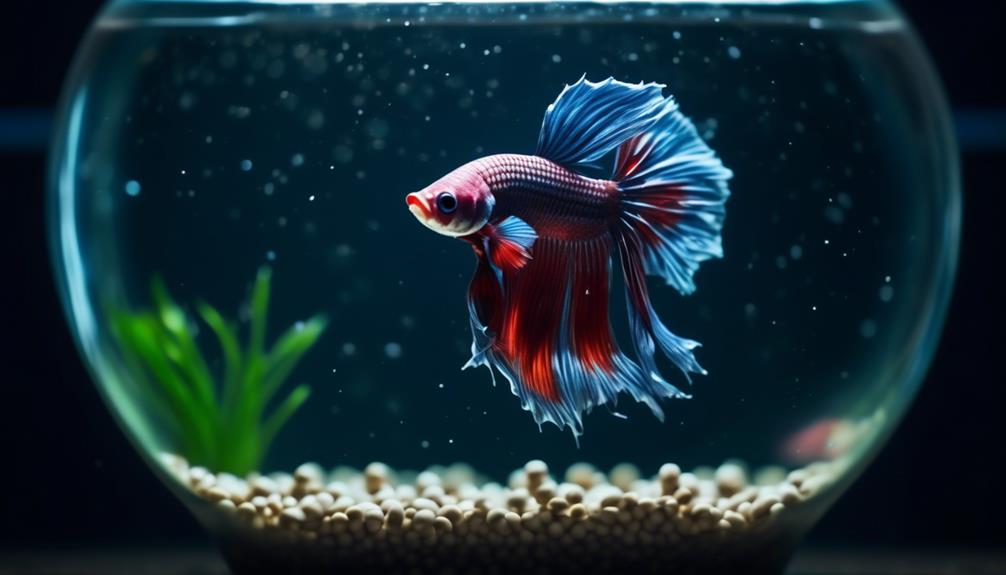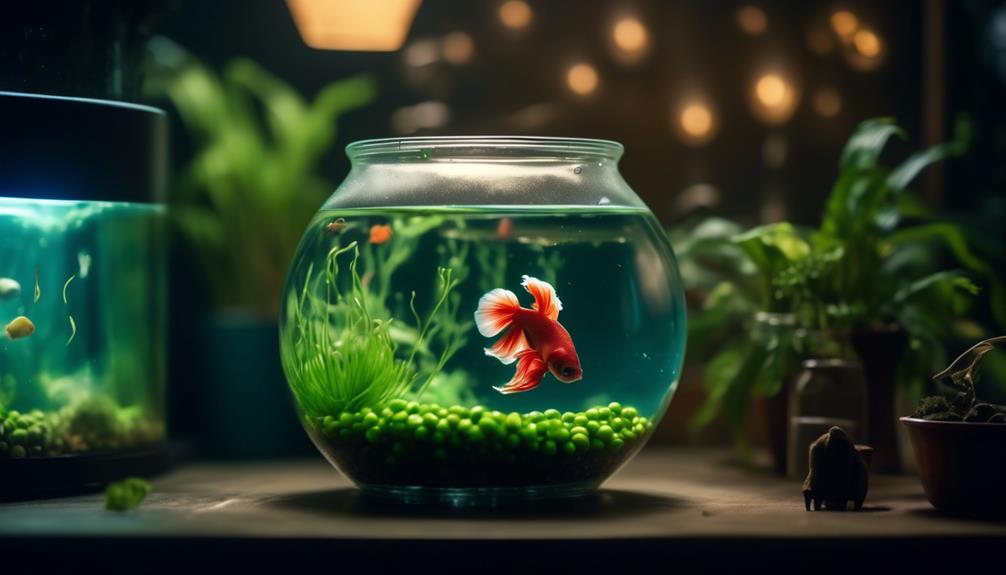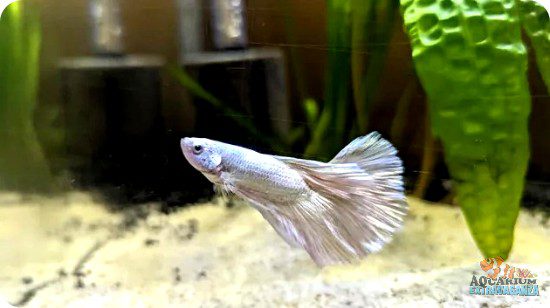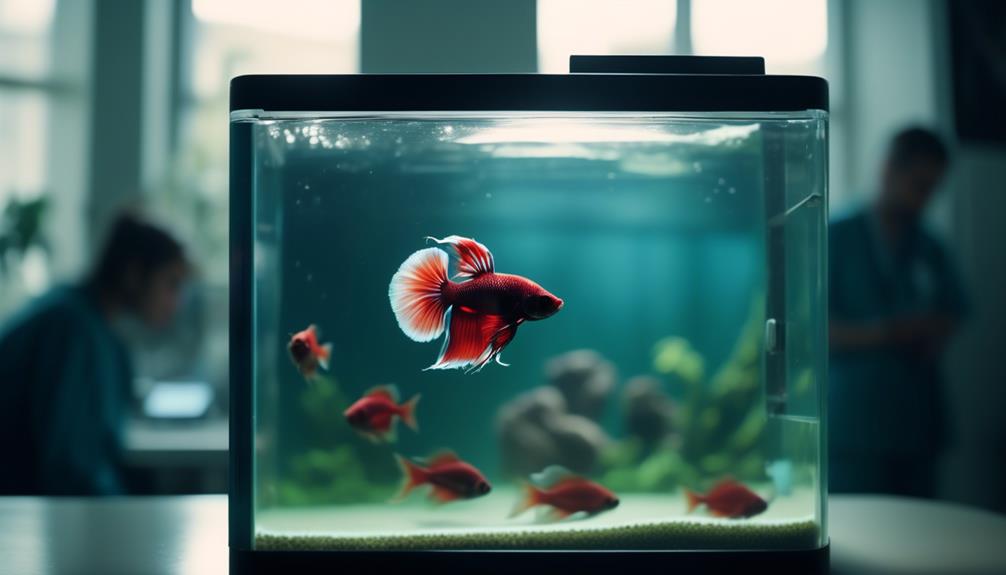Did you know that even fish need to poop? Just like dogs and cats, they have their own bathroom habits that need to be monitored.
But how can you tell if your betta fish is pooping?
As an experienced betta owner, I can help you identify and treat constipation in your betta.
Fish have unique care needs and health issues, and knowing how to assess and treat them is important.
Mike’s Thoughts
Constipation in betta fish is a serious concern.
Early signs such as bloating and lethargy in swimming should be monitored closely.
Dietary changes, including increased fiber and regulated feeding quantities, are immediate steps I plan to take.
Utilizing home remedies, such as Epsom salt baths, can be effective in alleviating symptoms.
Ensuring ample space for swimming and a nutritious diet are proactive measures for prevention.
I’ve put a bunch more detail below that expands on the topic, so feel free to read on and leave a comment if you have any questions or reach me on Facebook.
What is Constipation in Betta Fish?
Fish can get constipated just like us.
It happens when they have trouble pooping because their poop gets too hard.
When this happens, it blocks their digestive system, and more food gets stuck each time they eat.
Constipation Symptoms
Recognizing constipation symptoms early is key to helping them feel better.
The main symptom of constipation include loss of appetite. If my betta spits out food or ignores it altogether, I know something’s not right.
When a betta fish is constipated, you’ll often notice its belly looks bloated and it may show less interest in swimming around.
I’ve seen my betta becoming lethargic, too. It’s clear when they’re not their usual, active selves.
The swollen bloated belly is a common sign of constipation in betta fish.
Stringy poop is another clue. It’s not the normal poop I’m used to seeing when I check their tank.
Sometimes, a constipated betta fish may have trouble swimming properly. This can be because of swim bladder disease, which is often linked to constipation.
When I see my betta struggling to swim or floating in an odd position, I take it seriously.
Constipation might seem like a small issue, but for a betta fish, it can lead to bigger health problems if it’s not addressed. That’s why I always keep an eye out for these signs and take action quickly.
Constipation Causes

Having recognized the symptoms of constipation in betta fish, it’s crucial to understand what causes this condition to prevent it effectively.
A common cause of constipation is a poor diet. Bettas have a short esophagus and intestine, making it hard for them to digest certain types of food. To prevent constipation, ensure your betta has a balanced diet.
Overfeeding your betta is another big no-no. It can easily lead to an overloaded digestive tract. It’s key to feed your betta the right amount.
Make sure they don’t have any injury or infection which make cause swim bladder disease.
Also, don’t forget exercise. A small tank means less room to move, which can cause constipation.
No products found.
| Cause | Emotional Trigger |
|---|---|
| Small Tank Size | Lack of Freedom/Exercise |
| Inadequate Live Food | Poor Nutritional Value |
| Flakes and Freeze-Dried | Unnatural Diet |
| Overfeeding | Neglectful Care |
| Poor Fiber Diet | Health Deterioration |
| Swim Bladder Disease | Injury or Infection |
| High Amount of Blood Worm | Unatural Diet |
Constipation Treatment

To maintain the digestive health of betta fish and prevent constipation, it is essential to provide a balanced diet that includes fiber-rich foods such as daphnia and occasionally blanched peas.
No products found.
Pre-soaking flakes and avoiding overfeeding by limiting feedings are crucial practices to keep their stomachs from expanding excessively.
Varied nutrition with high-quality pellets, daphnia, and mosquito larvae, while minimizing freeze-dried foods unless soaked, also supports their digestive system.
No products found.
Implementing fasting periods of a day or two can reset digestive health, while home remedies like Epsom salt, used as a muscle relaxant in a ratio of one teaspoon per 5 gallons of tank water, can ease constipation and related swim bladder issues.
No products found.
Consistent attention to these dietary and treatment strategies ensures betta fish remain active and free from constipation.
Here’s a quick table summarizing these remedies:
| Remedy | How It Helps | Usage |
|---|---|---|
| Fasting | Resets digestive system | No food for 2-3 days |
| Peas | High-fiber, stimulates bowel | After fasting, feed sparingly |
| Epsom Salt | Muscle relaxant | 1 tsp per 5 gallons of water |
| Daphnia | Fibrous food source | Feed as part of regular diet |
| Vet Consultation | Expert guidance | If condition doesn’t improve |
Constipation Prevention Strategies
Preventing constipation in betta fish starts with creating an environment that encourages regular activity and proper digestion.
A spacious tank is key. It lets my betta swim more, which is great for its health and keeps its digestive system moving.
I also pay close attention to what I feed my betta.
Live foods are a big help. They provide fiber, which is like nature’s broom for a betta fish’s digestive system. I make sure to include these in my betta’s diet to help prevent constipation.
Before I drop flakes into the tank, I soak them. This stops them from expanding in my betta’s stomach, which can lead to constipation. I’ve learned that a well-balanced diet with enough fiber is crucial. It’s not just about the quantity but also the quality of the food.
I’ve got to be careful not to overfeed my betta. Overfeeding is a common cause of constipation. I limit feeding times to keep my betta’s diet in check.
No products found.
Lastly, I keep an eye on the tank water. Good water quality means a healthy betta with a lower risk of constipation.
Persistent Symptoms
If your betta fish still shows signs of constipation after you’ve tried home treatments, it’s time to consult a local vet.
Maybe you’ve tried Epsom salt baths or fed your fish frozen daphnia to help their digestive system. But if the problem doesn’t go away, it could be serious. Long and stringy betta poop isn’t a good sign.
And if your betta has trouble swimming or its swim bladder seems off, that’s worrying too.
Persistent bloating, not wanting to eat, or just acting tired all the time means something’s wrong. If these symptoms keep up, don’t wait. I’d definitely take my betta to see a professional.
They can figure out what’s happening and how to fix it. It’s better to be safe than sorry.
Frequently Asked Questions
How Do I Unconstipate My Betta Fish?
Adjusting my betta’s diet, reducing feeding frequency, and monitoring water quality to ensure digestive health. Aalso using fasting techniques and checking swimming patterns for stress factors affecting their nutritional balance.
How Do You Cure Constipation in Fish?
I treat fish constipation with dietary adjustments, like pea feeding, and fiber supplements. I also practice fasting, ensure swimming exercise, check water temperature, maintain quality, reduce stress, use probiotics, and observe my fish’s behavior closely.
Does My Betta Fish Have Dropsy or Constipation?
If your fish is looking a bit bloated, don’t rush to think it’s just a tummy issue from too much food. There’s something called dropsy, and it’s serious. Dropsy makes your fish swell up because fluids are building up inside them. This is not good and can be really bad for your betta fish.
Now, how do you tell if your fish is just constipated or has dropsy? Keep an eye on the belly.
If it’s just constipation, your fish’s scales will be nice and smooth.
But if it’s dropsy, the scales will stick out like a pinecone’s surface. That’s a big red flag.
Let’s talk dropsy signs. You might see your fish’s eyes popping out, their spine bending, their fins clamping down, and they might not want to eat. Look for pale gills, stringy white poop, scales sticking out, swimming like they’re in trouble, a puffy bottom, a big belly, and even sores on their body.
These nasty signs might show up one by one, but if you don’t do something about it, they’ll gang up on your fish. And we don’t want that. It starts with their belly problems, and then it gets worse from there.
On the flip side, if your fish is just having a hard time going to the bathroom, it could be they need more fiber in their diet. Just like us, fiber helps them stay regular.
Can You Give a Betta Fish Epsom Salt for Constipation?
Yes, use Epsom salt to help my betta with digestive health. It’s important to balance their diet, manage feeding frequency, and maintain water temperature and tank cleanliness to prevent stress and constipation.
How Do You Remove Poop From a Betta Fish?
To remove poop, clean betta’s tank regularly, observing its behavior for any stress signs. I ensure water quality, vary its diet, and control pellet size to maintain its swim bladder health.
Is constipation fatal in betta fish?
If your fish is constipated, it can lead to swim bladder disease and cause stress, weakening its immune system.
This makes the fish vulnerable to infections and diseases.
So, while constipation itself may not kill your fish, its side effects could be dangerous.
Conclusion
I’ve learned that constipation in betta fish is no small issue. It’s key to spot the signs early, like bloating and lazy swimming. I’ll adjust their diet, add fiber, and not overfeed.
Home remedies like Epsom salt baths can help too. To prevent trouble, I’ll make sure my betta has room to move and a balanced diet.
If things don’t improve, I won’t hesitate to call a vet. Keeping my fish healthy is my top priority.


